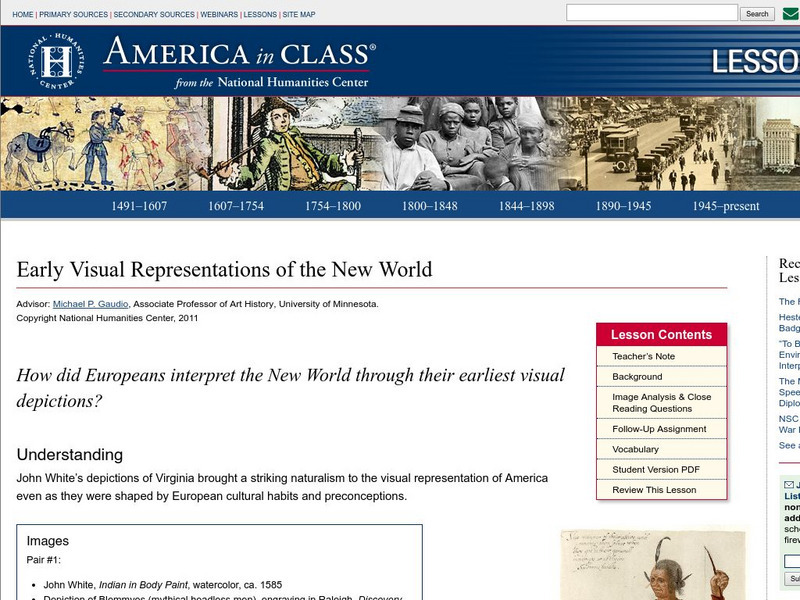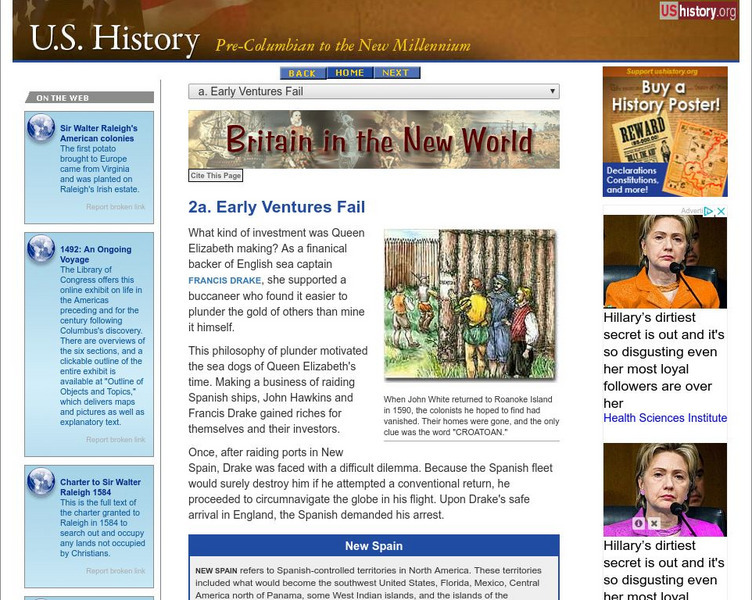Hi, what do you want to do?
Curated OER
Applied Science-Techonology Post Lab
Students study animals. In this machines and tools lesson, students study animals to figure out how various tools were created for humans to use. They are read the story An Elephant Never Forgets its Snorkel to help spark ideas. They...
Curated OER
The Search for the Northwest Passage
Third graders listen to lectures and research the motivations and history of the Spanish, French and English explorers searching for the Northwest Passage to India. They trace routes on maps and consider how these explorers helped shaped...
Curated OER
Hispanic Immigration: America in the Year 2000
Students investigate the underlying reasons for immigration, focusing on five major trends: political, economic, family, career and educational. They examine the immigration of Spanish speaking groups.
Curated OER
Hardships of the Maine-land
Fifth graders examine the design of the Maine quarter reverse and identify the objects depicted. They compare the settlement at Popham, Maine with that at Jamestown, Virginia.They write journal entries and draw pictures about the Maine...
Curated OER
"Julie of the Wolves"
Fifth graders research life in Alaska and compare life there to their lives in this activity. They read "Julie of the Wolves." They research through the novel and other reference books facts about the Alaskan climate and geography. ...
Curated OER
Enrichment Activities - "Mrs. Frisby and the Rats of NIMH"
Fifth graders read the novel "Mrs. Frisby and the Rats of NIMH." They discuss the various characters in the book, and the different types of conflict that take place within the book. They also research owls and rats to make comparisons...
Curated OER
Artlex Online Vocabulary
Learners complete an artwork analysis and vocabulary activity. In this artwork and vocabulary lesson, students write definitions for the familiar terms from the worksheet. Learners select a piece of artwork from the web site to include...
Curated OER
Nureyev: Bringer of Light
Students examine Nureyev's artistic endeavors and achievements. For this language and art lesson, students analyze modes of dance expression at the end of the 19th - beginning of the 20th centuries. They focus on Martha Graham and...
Curated OER
Rockin' Chair, Louis Armstrong and Jack Teagarden
Students examine the life and music of Louis Armstrong, the first great jazz musician. The musical techniques of call and response is listened to and then copied in musical conversations in this instructional activity.
Curated OER
Colorado: Reading Comprehension
In this Colorado reading comprehension worksheet, learners read a 2-page selection regarding the state and then respond to 10 true or false questions.
Curated OER
Bronze: Scientific Inquiry through Chinese Art
Students examine the use of bronze and porcelain in Chinese art and commerce through in-class activities, role play events, and small-group discussions in this exciting Social Studies/Arts lesson.
Curated OER
Paper: Scientific Inquiry Through Chinese Art
Students create replicas of Chinese hanging scrolls in an attempt to understand the technology behind the creation and use of paper in Ancient China. This three-day lesson includes enrichment ideas.
Curated OER
Quick Questions
Students ask their classmates survey questions. In this survey lesson, students come up with a question and possible answers. Their classmates mark their answers and the class discusses what they notice.
Curated OER
Loss of Wetlands: Subsidence
Students observe subsidence and the effect it has on wetlands with a classroom demonstration. They think about the impact of global warming and the sea level and how it affects the marsh.
Curated OER
An Investigation of Primary and Secondary Sources Using The Records on Mary McLeod Bethune
Students listen to a summary of the life of Mary Bethune. They read or listen to an excerpt from an interview with Mary Bethune. They discuss the differences between the transcript and the draft of the biography.
Curated OER
Silk: Scientific Inquiry Through Chinese Art
Students investigate the many uses of silk in Chinese society through in-class experiments, group projects, and hands-on learning in this cross-curricular lesson. There are four main activities included in this lesson.
National Humanities Center
National Humanities Center: America in Class: Early Visual Representations of the New World
A lesson that examines how Native Americans were portrayed by artists in the sixteenth century, whose aim was to convey their appearance to a European audience, and thereby encourage investment in future New World explorations. By...
Independence Hall Association
U.s. History: Britain in the New World
Read about the early English explorers and find out why other countries did much more early exploration than the British. The defeat of the Spanish Armada turned the tide. Discover why the English now could explore and plant colonies.
McGraw Hill
Mc Graw Hill Higher Education: Old World, New Worlds
This article from McGraw-Hill Higher Education discusses European exploration in the late 1400s and 1500s and its impact on English colonization hundreds of years later.
Khan Academy
Khan Academy: French and Dutch Exploration in the New World
An overview of the French, Dutch, and English explorers in the late 1500's and early 1600's.
Khan Academy
Khan Academy: French and Dutch Exploration in the New World
Outline text explaining how the French, Dutch, and English explorers began to make inroads into the Americans in the late 1500s and early 1600s.
Independence Hall Association
U.s. History: Britain in the New World: Early Ventures Fail
Several Englishmen sailed to the New World to establish settlements for England. Read about Sir Humphrey Gilbert's fate, and the mystery of Roanoke. Follow Sir Francis Drake on the map as he circumnavigated the globe.
Curated OER
Cbc: Adventurers and Mystics: Europe and the New World
From the CBC television series about Canadian history comes this summary of the English and French search for a Northwest Passage. Find out how these explorations laid the basis for their claims in the New World.
Wisconsin Historical Society
American Journeys: Eyewitness Accounts Early American Exploration/settlement
A collaborative project of the Wisconsin Historical Society and National History Day, this site contains over 18,000 pages of primary source, eyewitness accounts of North American exploration starting with the Vikings.




























